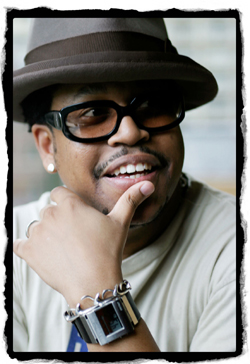Despite a five-year buildup, the new “mutant disco”—that is, dance music taking its most obvious cues from Kraftwerk, Giorgio Moroder, late-’70s/early-’80s label Zé Records, and a host of beat-obsessed post-punk bands—seems less about house and disco courting punk and new wave than a particularly lengthy, sleek detour. In a community that thrives to a greater extent than most on its willingness to abandon new sounds for newer ones as a matter of practice, the many strands of electronic dance music defy pop’s demand to milk a hit until the backlash forces producers and labels to pillage elsewhere. Five years is a long time to keep spinning vocoder vox and staccato, pinging beats. This isn’t to say mutant disco doesn’t still have a large following, but a few of this year’s most interesting releases suggest that the “middle of the road” (or MOR, in radio-programmer lingo) is, ironically enough, the next scheduled destination of dance music’s cutting edge.
The electroclash movement of the last few years yielded many fine tracks and moments of acidic hedonism, but it didn’t affect many pop-radio playlists. Chicago’s Felix da Housecat has been only too happy to skirt the edges of electro while maintaining a profitable sidetrack as an in-demand remixer for pop artists (Madonna, Britney Spears, P. Diddy). His I Know Elektrikboy, released in 1999 and credited to Thee Madkatt Courtship, helped jump-start the electroclash trend even as its creator claimed the “genre” was more about fashion than music. Felix’s new, song-centric Devin Dazzle and the Neon Fever (Emperor Norton) improves on 2001’s Kittenz and Thee Glitz, an album that hinted at his potential for writing concise, narrative-driven songs.
Kittenz was an electro benchmark, but nothing on it was as immediately engaging as Devin Dazzle‘s “Everyone Is Someone in L.A.” or “Ready 2 Wear.” On Kittenz, Felix arranged his songs with unchanging synthesizer patterns. On Devin Dazzle, he opens up his sonic palette with other elements of ’80s pop—check the metal guitar in “L.A.,” recalling Eddie Van Halen’s bout with Michael Jackson in “Beat It,” or the Prince-ly Linn drum machine of “Ready 2 Wear.” And he’s writing more traditional pop melodies now, as opposed to the staccato ones of his previous album—not to mention the more traditional verse-chorus-verse structures on “Rocket Ride” and “What She Wants,” far cries from the open-ended forms on Elektrik Boy and Thee Underground Made Me Do It, his 2003 foray into straight-up house.
Cologne’s Kompakt label has recently approached the shift toward MOR appeal from a different angle. Unlike Felix da Housecat’s reining in of established electro templates, Kompakt artists such as Superpitcher and Justus Köhncke actually emphasize the most extroverted aspects of the sound associated with the label, especially the breathy, wistful vocals. Kompakt has historically been more Brian Eno than the Bee Gees—embracing spacious ambience and crisp, uncluttered production—but it’s the unsubtle, catchy romanticism of Köhncke and Superpitcher that seem most distinctive on their roster today.
Superpitcher’s (aka Aksel Schaufler) new Here Comes Love (Kompakt) illustrates many of the same structural and performance strategies as Felix da Housecat’s new album: generally brief song lengths, instrumental textures borrowed from the mid-’80s, and easy-to-sing (or better, hum) melodies delivered by clear vocals high in the mix. Here Comes Love is uneven, and during the final track, hazy IDM flashbacks set in with a lengthy ambient loop. But its familiar means opens it up to dance outsiders. He covers Peggy Lee’s pop standard “Fever,” sticking closely (maybe too closely) to its familiar smoky, cocktail-lounge vibe as opposed to offering a more “modern” (read: abstract) interpretation. There’s also a cabaret-flavored torch song (“Träume”) worthy of Visitors-era ABBA, suggesting Superpitcher’s kind of drama is theatrical where most of his Kompakt peers would turn the other cheek.
Norway’s Erlend Øye, meanwhile, is something of a one-man show. He typifies one strand of DJs unconcerned with traditional dance-floor basics like beat-matching and flow, rather choosing songs American Idol–style, using his favorites as launching pads for his own expression. Øye’s volume of Studio !K7’s DJ Kicks series features his a cappellas over infectious songs by Phoenix (who’ve done their part for an MOR pop revival with the new Alphabetical), Alan Braxe and Fred Falke, and the Rapture. On DJ Kicks, Øye presents this music the way a radio DJ might, fading out the records as he sings the refrain of the next song up (or in the case of Braxe and Falke’s instrumental “Rubicon,” just announcing it), from the folky, understated bounce of Cornelius’ “Drop” to the Moroder-informed digital disco of Köhncke’s “2 After 909.” They’re unified by his preference for smooth textures and melodies that resonate long after the mix has finished.
Felix da Housecat plays Chop Suey with Doug and Recess at 9 p.m. Sat., July 3. $15 adv.




